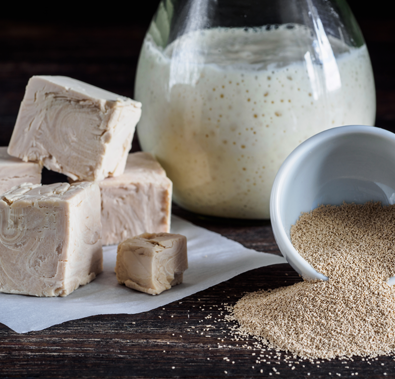Yeast
Whilst it is possible for the body to develop a sensitivity or intolerance to any food or drink item there are certainly those, which are very common.
Yeast is a fungus, which feeds on sugars. It is used in the baking of products like bread. It may also be found in pastries, biscuits, crackers, cereals, stock cubes and alcohol, such as beer and cider.
When yeast is combined with flour and water, sugars are released. The yeast feeds on this sugar and produces carbon dioxide. It is the carbon dioxide, which makes bread and cakes rise. It is possible to substitute baking soda and an acid in order to produce carbon dioxide and create this rise effect, though your baking may not rise quite as much or you may notice a difference in flavor or texture. You can use lemon juice, buttermilk or a mixture of milk and vinegar as your acid component.
Add equal parts baking soda and lemon juice to equal the amount of yeast required in the recipe. For example use 1 tsp. of baking soda and 1 tsp. of lemon juice if 1 tbsp. of yeast is required. The same applies if using buttermilk or a 50-50 mixture of milk and vinegar. Once all the ingredients are added make sure the mixture goes straight into the oven, no rest time is required.

Nutrition
Yeast contributes B vitamins, phosphorus and iron to recipes, which it is added into.
Replacing key nutrients when eliminating yeast
When eliminating items from the diet whether for the short term when implementing an elimination diet or for the long term, it is important to know alternative items that can be introduced into the diet to maintain nutrient balance. Yeast is in very small quantity within products therefore replacing nutrients is not of such great focus in this case. Below are the richest sources of each nutrient.
B Vitamins
Oats, buckwheat, brown rice, rye, whole wheat, peanuts, mushrooms, soybean flour and soybeans, split peas, pecans, sunflower seeds, lentils, cashews, chickpeas, broccoli, hazelnuts, peppers
Iron
Oats, whole wheat, rye, pumpkin seeds, sunflower seeds, sesame seeds, chicken liver, oysters, mussels, clams, cashews, pine nuts, hazelnuts, peanuts, almonds, beef, lamb, lentils, white beans, soybeans, kidney beans, chickpeas, lima beans, spinach, Swiss chard, kale, dark chocolate
Phosphorus
Oats, brown rice, rye, whole wheat, quinoa, chicken, turkey, pork, liver, sardines, scallops, salmon, mackerel, crab, milk, yogurt, cottage cheese, sunflower seeds, pumpkin seeds, Brazil nuts, pine nuts, almonds, pistachios, cashews
Complementary Alternative Medicine (CAMS)
Our food sensitivity tests are carried out using bioresonance therapy and is categorised under Complementary and Alternative Medicines (CAMs) which covers a wide range of therapies that fall outside mainstream medicine. Tests and related information provided do not make a medical diagnosis nor is it intended to be a substitute for professional medical advice, diagnosis or treatment.
Always seek the advice of your doctor or other qualified health provider if you have a medical condition or with any questions you may have regarding a medical condition and/or medical symptoms.
Order your test
We believe that in providing you with your test results and relevant information in each section, your results can form the beginning of a journey, enabling you to make positive changes to your daily diet and environment.
